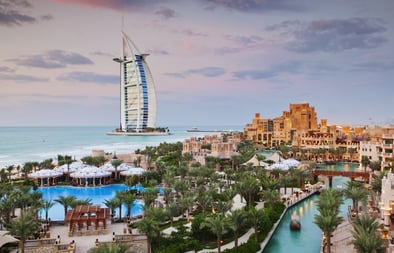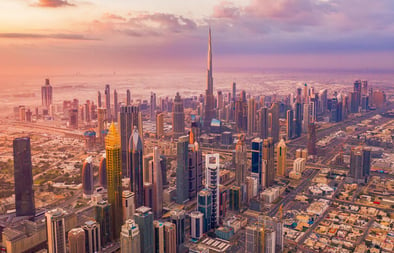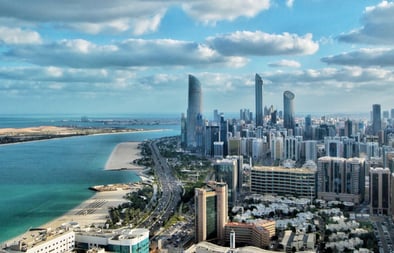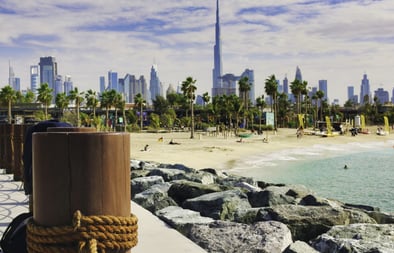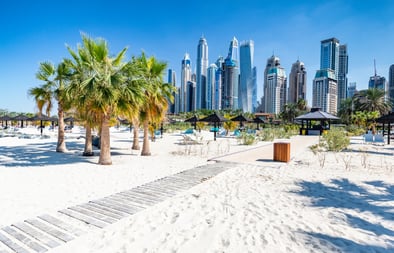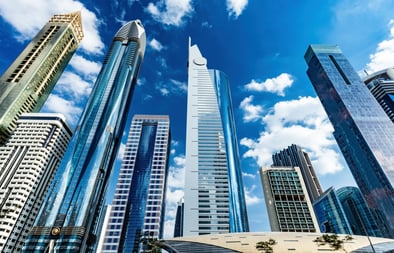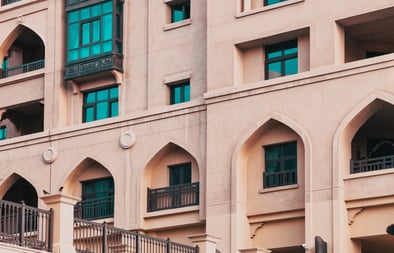Dubai's real estate market has undergone remarkable transformation and exponential growth over the past two decades, evolving into one of the most dynamic and sought-after property investment hubs in the world. Once a city characterized by its modest beginnings, Dubai has risen to prominence with its iconic skyline, adorned with architectural marvels such as the Burj Khalifa and the Palm Jumeirah, and its burgeoning array of luxurious developments. The city is now synonymous with opulence, innovation, and a forward-thinking approach to urban development. This meteoric rise has established Dubai as a magnet for global buyers and investors seeking lucrative opportunities in a market renowned for its high returns and expansive potential.
Yet, while the allure of Dubai's real estate market is undeniable, navigating this complex landscape necessitates a comprehensive understanding of the legal framework that governs property transactions. The intricacies of Dubai’s real estate laws can be daunting for both newcomers and experienced investors, as they encompass a range of regulations designed to protect the rights of all parties involved and ensure a transparent and secure investment environment. From the initial stages of property acquisition and financing to the nuances of tenancy laws and dispute resolution, each aspect of the legal framework plays a crucial role in shaping the investment experience.
This comprehensive guide aims to demystify the key real estate laws in Dubai, offering an in-depth exploration of the regulations and processes that govern property transactions in this vibrant city. Whether you are a first-time buyer eager to invest in Dubai’s burgeoning market or a seasoned investor looking to refine your understanding of the legal landscape, this guide provides valuable insights and practical information to navigate the complexities of Dubai’s real estate sector with confidence. By delving into the essential legal aspects, this guide seeks to equip you with the knowledge necessary to make informed decisions and capitalize on the abundant opportunities that Dubai's real estate market has to offer.
Historical Context
The evolution of Dubai's real estate laws is a fascinating reflection of the city's remarkable journey from a modest trading post to a global metropolis renowned for its innovation and luxury. The trajectory of these laws has been closely intertwined with Dubai's rapid and unprecedented development, driven by a vision to establish a transparent, secure, and attractive investment environment. Before 2002, the property ownership landscape in Dubai was markedly different, characterized by significant restrictions that limited ownership primarily to UAE nationals and citizens of the Gulf Cooperation Council (GCC) countries. This restriction was rooted in a regulatory framework designed to protect local interests and maintain control over property transactions in a rapidly growing city.
However, the landscape began to shift dramatically with the introduction of the Freehold Decree in 2002. This landmark decree represented a revolutionary turning point in Dubai’s real estate sector, fundamentally altering the ownership dynamics by granting expatriates the right to purchase freehold property in designated areas. This change was a strategic move to attract foreign investment, reflecting a broader ambition to position Dubai as a premier global investment destination. The implications of the Freehold Decree were profound, catalyzing a surge in international interest and investment that significantly reshaped Dubai’s skyline and urban landscape.
The introduction of this decree paved the way for the development of some of Dubai’s most iconic and world-renowned projects. The Palm Jumeirah, with its ambitious design and luxury residences, the Burj Khalifa, towering as the tallest building in the world, and Dubai Marina, with its sophisticated waterfront lifestyle, all stand as testaments to the transformative impact of this legal shift. These projects not only elevated Dubai’s global profile but also set new standards in real estate development and urban planning. The evolution of Dubai's real estate laws, marked by this pivotal decree, thus encapsulates a broader narrative of rapid growth, strategic innovation, and a commitment to fostering a world-class investment environment.
Key Legal Frameworks
1. Dubai Land Department (DLD)
The Dubai Land Department (DLD) is the principal authority overseeing real estate matters in Dubai. Established in 1960, the DLD is responsible for regulating the property market, facilitating property transactions, and maintaining property records. The department operates several specialized agencies, including the Real Estate Regulatory Agency (RERA), which plays a crucial role in enforcing real estate laws and regulations.
2. Real Estate Regulatory Agency (RERA)
RERA, established in 2007, is the regulatory arm of the DLD. Its primary mandate is to regulate and oversee the real estate sector, ensuring transparency, protecting the rights of all parties involved, and promoting sustainable development. RERA's responsibilities include licensing real estate brokers, approving project plans, and resolving disputes through the Dubai Rental Disputes Center.
Property Ownership Types
Dubai offers various property ownership options, each with its own legal implications. Understanding these distinctions is essential for making informed investment decisions.
1. Freehold Ownership
Freehold ownership grants the buyer complete ownership of the property and the land it stands on. This type of ownership is available to both UAE nationals and expatriates in designated freehold areas. Freehold properties can be bought, sold, leased, or transferred at the owner's discretion. Key freehold areas include Downtown Dubai, Dubai Marina, Palm Jumeirah, and Arabian Ranches.
2. Leasehold Ownership
Leasehold ownership allows the buyer to lease the property for a specified period, typically ranging from 30 to 99 years. The leasehold owner has the right to use the property during the lease term but does not own the land. Leasehold properties are often found in areas like Dubai Festival City and Dubai Silicon Oasis.
3. Usufruct and Musataha Rights
Usufruct and Musataha are long-term lease agreements that grant the right to use and benefit from a property. Usufruct agreements can extend up to 99 years, while Musataha agreements can last up to 50 years. These rights are commonly used in commercial real estate transactions, allowing investors to develop and utilize the land without full ownership.
Buying Process
The process of buying property in Dubai involves several steps, each governed by specific regulations to ensure a transparent and secure transaction.
1. Initial Agreement
The buying process typically begins with a Memorandum of Understanding (MOU) between the buyer and seller. The MOU outlines the terms and conditions of the sale, including the purchase price, payment schedule, and any special conditions. A non-refundable deposit, usually around 10% of the purchase price, is paid at this stage.
2. No Objection Certificate (NOC)
For secondary market transactions, the seller must obtain a No Objection Certificate (NOC) from the developer. The NOC confirms that there are no outstanding service charges or liabilities on the property. The developer may charge a fee for issuing the NOC.
3. Final Sale Agreement and Transfer
The final sale agreement is signed at the Dubai Land Department's office, where the property transfer takes place. Both parties must be present, along with their respective agents. The DLD oversees the transfer process, ensuring all legal requirements are met. The buyer pays the remaining balance, along with a 4% transfer fee to the DLD.
4. Title Deed Issuance
Upon successful completion of the transfer, the DLD issues the title deed in the buyer's name, officially registering them as the new owner. The title deed is a crucial document that confirms ownership and can be used as collateral for obtaining financing.
Financing and Mortgages
Dubai's banking sector offers a range of financing options for property buyers, including mortgages for both UAE nationals and expatriates. Understanding the mortgage process and the associated regulations is essential for securing financing.
1. Eligibility and Requirements
Mortgage eligibility criteria vary by bank but generally include a minimum salary requirement, a stable employment history, and a good credit score. Lenders typically offer financing up to 75% of the property value for expatriates and up to 80% for UAE nationals.
2. Mortgage Process
The mortgage process involves several steps, including pre-approval, property valuation, and final approval. Pre-approval provides an estimate of the loan amount the buyer qualifies for, helping them set a budget for their property search. Once a property is selected, the bank conducts a valuation to determine its market value. Final approval is granted based on the valuation and the buyer's financial profile.
3. Mortgage Regulations
The UAE Central Bank regulates mortgage lending, setting limits on loan-to-value (LTV) ratios, debt-to-income (DTI) ratios, and other key parameters to ensure responsible lending practices. The Central Bank also mandates that mortgage terms cannot exceed 25 years and that the borrower's age at the end of the term cannot exceed 65 years.
Tenant and Landlord Rights
Dubai's rental market is governed by laws that protect the rights of both tenants and landlords, fostering a balanced and fair rental environment.
1. Tenancy Law (Law No. 26 of 2007)
The Tenancy Law, enacted in 2007, regulates rental agreements and outlines the rights and responsibilities of tenants and landlords. Key provisions of the law include:
• Lease Terms: In Dubai, lease agreements must be registered with the Ejari system, which is managed by the Real Estate Regulatory Agency (RERA). This registration formalizes the lease and ensures that the terms cannot be changed unilaterally during the lease period. Any adjustments to the lease must be mutually agreed upon and documented through official channels, safeguarding both landlords and tenants from arbitrary changes.
• Rent Increases: Rent increases are regulated by the Rental Increase Calculator, a tool provided by RERA. This calculator determines allowable increases based on current market conditions, the previous rent amount, and the duration of the tenancy. By using this tool, rent adjustments are regulated and fair, protecting tenants from excessive hikes and ensuring stability in the rental market.
• Eviction: Landlords in Dubai can only evict tenants under specific conditions such as non-payment of rent, illegal activities, or personal use of the property. They must provide tenants with adequate notice, typically 30 days, before proceeding with eviction. This notice period ensures tenants have time to address the issue or find alternative housing, balancing the rights of both parties in the eviction process.
2. Security Deposits
Security Deposits: In Dubai, security deposits serve as a financial safeguard for landlords against potential damages or unpaid dues that may arise during a tenancy. Typically, the security deposit amount is equivalent to one month's rent, though this can vary based on the landlord's policy or the specific terms of the lease agreement. The deposit is collected at the beginning of the lease term and is held in trust by the landlord throughout the duration of the tenancy.
At the end of the lease term, the landlord is obligated to return the security deposit to the tenant, provided that the property is returned in good condition and there are no outstanding financial obligations such as unpaid utility bills or rent. The condition of the property is usually assessed during a final inspection, which is often conducted in the presence of both the landlord (or their representative) and the tenant. This inspection aims to identify any damages beyond normal wear and tear that might justify deductions from the deposit.
3. Maintenance Responsibilities
The landlord is responsible for major maintenance and repairs, while the tenant is generally responsible for minor upkeep and day-to-day maintenance. These responsibilities should be clearly outlined in the lease agreement to avoid disputes.
Dispute Resolution
Disputes between landlords and tenants, or between buyers and sellers, are resolved through specialized legal channels to ensure fair outcomes.
1. Dubai Rental Disputes Center
The Dubai Rental Disputes Center (RDC) is a judicial body established to resolve rental disputes efficiently and impartially. The RDC handles cases related to rent increases, eviction, maintenance issues, and other tenancy-related matters. The process involves filing a complaint, mediation, and, if necessary, a judicial ruling.
2. Property Court
The Dubai Courts system includes a dedicated Property Court that handles disputes related to property transactions, ownership issues, and contractual breaches. The court ensures that all parties receive a fair hearing and that decisions are based on the principles of justice and equity.
Conclusion
Understanding the legal landscape of Dubai's real estate market is essential for making informed investment decisions and ensuring smooth property transactions. From the initial stages of property selection and financing to the nuances of tenancy laws and dispute resolution, a comprehensive grasp of the legal framework can significantly enhance your investment experience. By staying informed and seeking professional advice when necessary, you can navigate Dubai's real estate market with confidence, maximizing returns and minimizing risks. Whether you are a seasoned investor or a first-time buyer, this guide serves as a valuable resource for understanding the intricacies of real estate laws in Dubai.
























